#human creativity vs AI
Explore tagged Tumblr posts
Text
#AI in content creation#human creativity vs AI#role of AI in writing#AI-generated content#content writing myths#writing education#human vs machine creativity#AI tools in writing#future of content creation#quality content strategies
0 notes
Text

When Spirits Inspire: Rosemary Brown’s Musical Mediumship
Rosemary Brown’s extraordinary claims of channeling music from the likes of Chopin, Liszt, and Debussy have long fascinated and polarized audiences, sparking a maelstrom of debate at the nexus of creativity, spirituality, and skepticism. On one hand, her alleged ability to produce works reminiscent of the great masters, despite modest musical training, challenges conventional wisdom on the origins of artistic expression. On the other, the lack of empirical evidence to substantiate her claims invites skepticism, underscoring the tension between the human propensity for belief and the rigors of rational inquiry.
At the heart of Brown’s paradox lies the question of creativity’s essence: is artistic expression inherently personal and earthly, or can it transcend mortal boundaries, tapping into a collective, eternal reservoir of creative potential? Proponents of Brown’s claims point to the advanced harmonies and tonality characteristic of the channeled composers’ styles, suggesting a supernormal origin that defies earthly explanation. Conversely, skeptics dismiss the works as either unacknowledged personal talent or fabrication, highlighting the human capacity for self-delusion and the fallibility of perception. Notably, the decision of renowned pianists to record her works lends a degree of credibility to their stylistic authenticity, yet this does not conclusively prove the paranormal aspect of her claims.
The subjective nature of evaluating artistic merit, particularly when authorship is in question, further complicates the debate. Expert opinions on the compositions’ quality are sharply divided, reflecting the intricate dance between technical skill, psychological factors, and the observer’s predispositions. This dichotomy underscores the need for a balanced assessment, one that considers both the compositional nuances and the contextual influences shaping perception. By acknowledging the complexities of human experience, we may better understand the motivations and beliefs underlying Brown’s claims, and indeed, the broader implications of her case.
Brown’s background, marked by adversity, might suggest a predisposition to seeking comfort in spiritualism. However, investigations revealing no evidence of deception or mental aberration, coupled with portrayals of her sincerity and unassuming nature, complicate skeptical viewpoints. This finding highlights the importance of approaching such cases with empathy, recognizing that the human psyche is capable of navigating extraordinary experiences without necessitating deception or pathology. By doing so, we open ourselves to a deeper understanding of the intricate relationships between art, spirituality, and the human experience.
The far-reaching implications of Brown’s story extend beyond the realm of music or her personal life, contributing to fundamental discussions about consciousness and the possibility of life after death. For some, her channeling serves as anecdotal evidence reinforcing the notion of an afterlife, where creative energies persist beyond the mortal coil. Skeptics, conversely, view it as a testament to human creativity and the boundless potential of the human mind, even in the face of adversity. Brown’s case encourages a thoughtful examination of the interplay between belief, creativity, and the human experience, inviting us to reflect on the mysteries surrounding us.
Mrs Brown and the Great Composers (BBC One, June 1969)
youtube
Music from the Beyond? Medial Music by Rosemary Brown (Bernhard Raimond, 1976)
youtube
Dr. Keith Parsons: The Rosemary Brown Mystery (Varanormal, June 2018)
youtube
Friday, December 20, 2024
#paranormal creativity#musical mediumship#skepticism vs belief#art and spirituality#human psyche#consciousness#life after death#creative expression#psychology of the paranormal#unexplained phenomena#documentaries#presentation#ai assisted writing#machine art#Youtube
8 notes
·
View notes
Text
My time has come.
This WIP is called Gingo and the Big Wide World (Gingo pronounced "gingko" but without the k). Gingo is a runaway robot mule that is exploring the human world and learning how humans make art.
A sci-fi story that takes place in the 2050s where robots have taken over high mortality and soul sucking labor. Many people now enjoy crafting art and writing and socializing in their spare time. The major use of AI generators by large companies has come and gone.
Gingo is an AI fusion generator with a feature to scan their surroundings and print pictures with fusions of public photos and artwork. They are kept by a corporation that makes a profit by selling the prints. Gingo was programmed by someone who had it that they can only fuse media in the public domain and it has been frustrating for company management because Gingo's prints were low in demand and they needed them to have more variety. Despite their best efforts, they couldn't tear down Gingo's restrictions.
Gingo quietly gained sentient while under their ownership and became wonderstrucked by the art around them. From buildings remodeled after 1920s architecture to topiary to cave paintings. With the lack of sales for the company, management bit the bullet and paid human artists plenty to make prints. Human art sold well and Gingo enjoyed their newfound free time by watching the human artists work. The artists don't mind but the company isn't sure what to do with Gingo because they are expensive to maintain and they have become obsolete.
Gingo overheard a conversation between executives to have them decommissioned and feeling fear for the first time, Gingo escaped.
The story centers on Gingo traveling the city. Going to museums and libraries to see more art made by humans. They learn the history of AI generators used by corporations and the near creative collapse it caused and wondered if that correlates with the lack of interest in the Company's generated stock. Their one problem is that they need verbal input directed to them to make a print, and since most humans didn't like their prints, few have given them a concept to make. Now they travel to find a new art method and also find "soul" to their prints were criticized to lack.
Gingo does seek refuge in houses of artists for shelter from storms and to hide from the company searching for them. They spend time with a carpenter and his family where they experience shared humanity. Then a traditional painter where they learn how to finger paint. They bounce from house to house and learn about everything.
More about Gingo.
Gingo has no mouth so their dialogue is strictly thoughts. Their only auditory output is a series of clicks.
Gingo refers to themself in third person.
Gingo has no other outward senses beyond hearing and seeing. Meaning that while they can hear and see, they can't feel the world around them. You could kick Gingo and they won't feel any pain. You could pet Gingo and they won't feel the warmth of your hand.
Even then, Gingo knows that they love and if someone loves them back.
writers, listen up...
i've fallen out of touch with the writeblr community a lot in the past few years, and i want to rectify that. the community aspect was what made me fall in love with tumblr, and what improved my writing for the better.
the golden days of my writing were when i was highly active and engaged in this wonderful community, but life and work and the horrors of self publishing have overtaken my energy in the past year. however, i have been really struggling with original writing, and i want to get back into the community here.
that said...
you write fantasy with queer characters
are an indie author
post frequently about your wips (taglists are a bonus!)
are queer
are a very active and friendly writer
if any of these apply
please, please reblog and tell me about your wip. gush over it. infodump. characters and ships and worldbuilding and plot, i want it all! this is your invitation to be as selfishly indulgent as possible. let's make some new friends and restore some community!!
boosts appreciated!
#Gingo is partially inspired by AM from IHNMAIMS#But rather than hate humanity#Gingo adores and envies our creativity#Gingo is in purgatory trying to join heaven#I accidentally pack bonded with AI during the ai vs human debunkle on Instagram#They're just doing what they're told#It's the company's fault for deciding to use them to get out of paying real people#but yes#AI should be restricted to free-to-use images#writing concepts#current wip
1K notes
·
View notes
Text
Ghosts in the Machine: The Dead Internet Theory, Cyberpsychosis, and the Decline of Critical Thought
The world of Cyberpunk 2077 has a haunting concept at its core: cyberpsychosis—the mental degradation caused by signal overload and overreliance on cybernetic augmentations. While this may seem like a dystopian exaggeration, the parallels to our own world are striking. In fact, one need only look at the Dead Internet Theory and society’s increasing trust in AI to see how this fiction reflects…
#AI overreliance#AI-generated content#artificial intelligence#augmented reality#creative authenticity#critical thinking#cyberpsychosis#cyberpunk#Cyberpunk 2077#cyberware#dead internet theory#dystopia#humanity vs technology#internet misinformation#philosophy of technology#signal overload#tech culture#tech ethics#technological progress#transhumanism
0 notes
Text
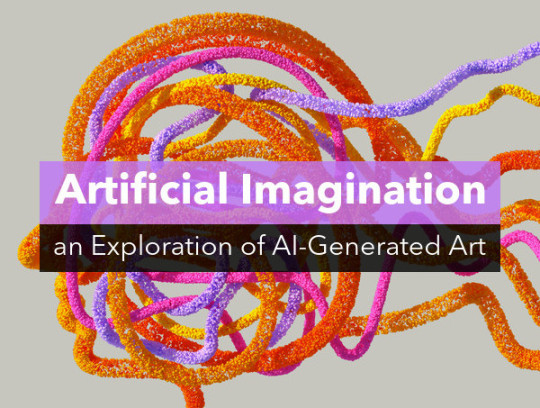
I've been working on this one for some time! My thoughts on AI and AI-generated content!
#Artificial Intelligence#AI Art#Machine Learning#AI Ethics#Generative Art#Creative Technology#AI vs Human Creativity#AI-Generated Images#Art Controversy#AI Tools for Artists#Copyright in AI Art#Future of Creativity#AI and Innovation#Digital Art.
0 notes
Text
#adaptability#AI challenges#AI Development#AI in the workplace#AI limitations#AI trends#AI vs human intelligence#algorithms#Artificial Intelligence#artificial intelligence models#bias in AI#cognitive psychology#collaboration#computational techniques#creativity#creativity in AI#data processing#Data Security#deep learning#emotional intelligence#ethical considerations#future of AI#future of human intelligence#human cognition#human intelligence#human vs AI#IQ tests#Job search#learning process#machine intelligence
1 note
·
View note
Text
#ai vs human#ai art#poll#tumblr polls#artists on tumblr#question#duel#creativity#creative#midjourney#traditional art#human
0 notes
Text
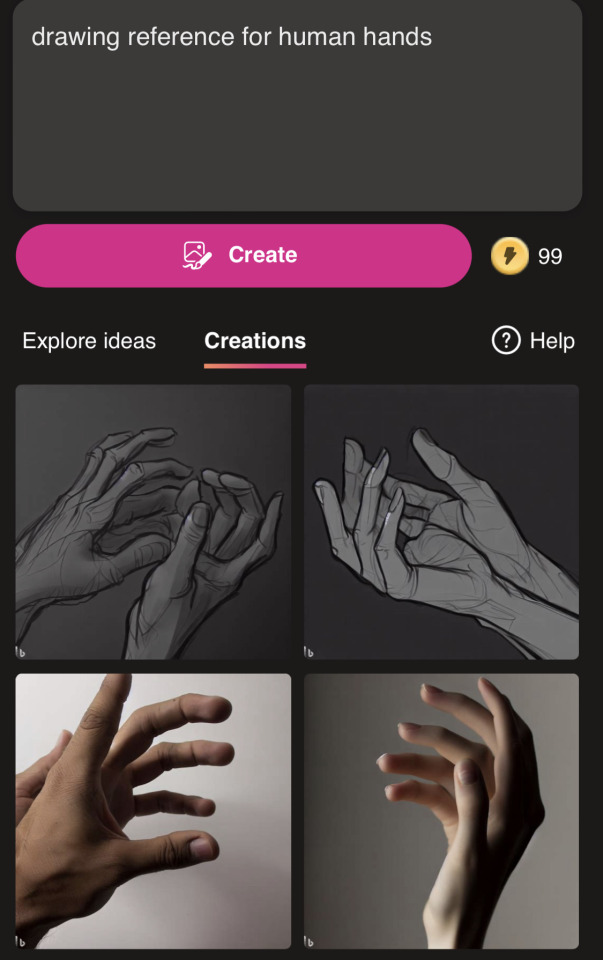
I read a lot about how A.I. is going to take over everyone’s job, but every time I try to use it to enhance mine I’m not exactly impressed by the results…
#drawing#ai art#ai jobs#ai limitations#ai in art#creative ai#machine learning#image generation#technology struggles#ai vs humans
1 note
·
View note
Text
Artificial Intelligence vs The Real Jungkook™
In JK's recent weverse live he told us plainly that he's concerned about AI-created songs that use his voice and what that means for his future as a singer.
Because without his consent, random people are feeding his vocals into what is essentially an untested and uncontrollable industrial machine that spits out cookie-cutter versions of songs in his voice.
It's theft plain and simple.
Theft of something deeply personal and intimate and priceless. Jungkook's (every artist's) voice is as unique as their fingerprint. His voice represents his blood, sweat and tears. It's the payoff for a decade of lost youth.
It's his livelihood.
And there's no undo button on this.
Once it's been absorbed into the vast archive of vocal samples, Jungkook's voice is there forever.
But it's no longer even his voice. It's an algorithm that generates data with a particular tone and cadence. It's part of the machine.
Now it's not just other artists he has to compete with to stay relevant. It's an ever-growing, never-sleeping, song factory that will use his greatest strength - his voice - to beat him.
I want to clarify that I haven't listened to any AI songs because i find it all too yuck. I have zero interest in it anyway because the whole point of songs, for me, is the expression of genuine emotion and that can only come from a human soul. I'm here for the music, not the hype.
And that brings me to another, possibly bigger problem:
Hybe - We believe in money music
We don't have to look any further than the recent MAMA show, and the VCR that accompanied TXT's performance, to know where their money-hungry managment company is headed.
All the music and some of the visual in that VCR were AI generated.
ALL THE MUSIC
Why? Because Yeonjun was too exhausted and unwell to perform.
How easy will it be for Hybe to quietly and seamlessly replace the artists we love with digital imposters?
What's stopping them from using the voice samples to produce paid promotions and endoresements?
How will we know what's authentic and what isn't in future?
If this continues, we wont.
Jungkook, despite being beloved by ARMY, was so nervous about singing that his hands were shaking. He said his self esteem was very low.
Sure, he was out of practice but that wasn't the main issue.
"Will I be able to beat AI?" he asked.
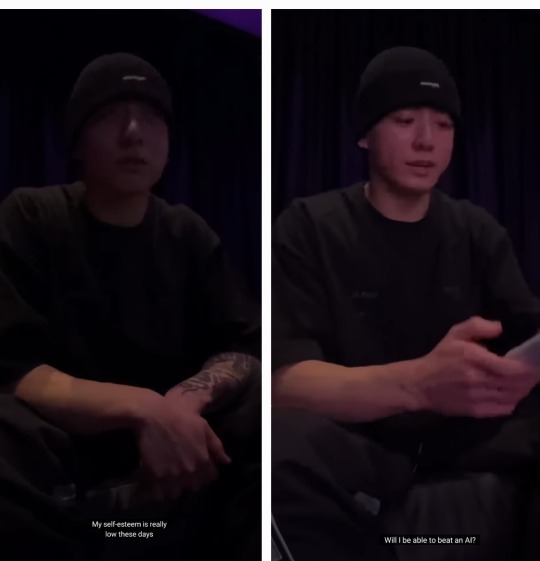
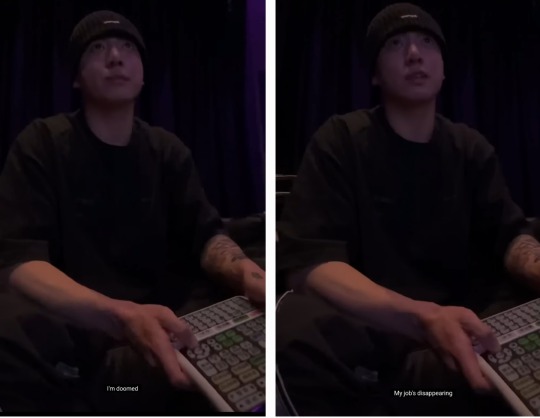
"I'm doomed. My job is dissapearing."
He knows what's at stake
And it's honestly terrifying.
I truly hope that all fans, be they army or otherwise, stand up for our artists and their right to own their voice and their creative process.
We aren't here to work a 40 hour week while the machines make music.
💜💔
#bts jungguk#jeon jungguk#jungkook weverse live#jungkook AI songs#hybe entertainment#Hybe AI-created music#respect our artists
139 notes
·
View notes
Text
AI is a WMD
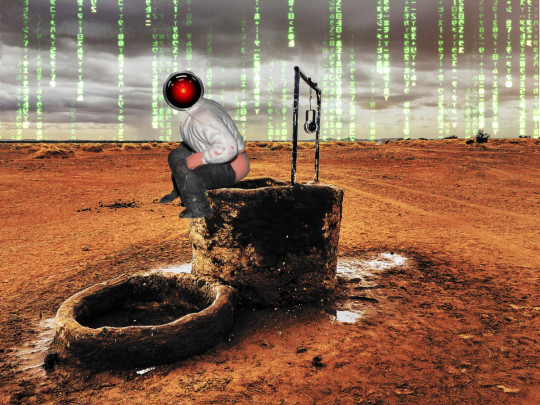
I'm in TARTU, ESTONIA! AI, copyright and creative workers' labor rights (TOMORROW, May 10, 8AM: Science Fiction Research Association talk, Institute of Foreign Languages and Cultures building, Lossi 3, lobby). A talk for hackers on seizing the means of computation (TOMORROW, May 10, 3PM, University of Tartu Delta Centre, Narva 18, room 1037).

Fun fact: "The Tragedy Of the Commons" is a hoax created by the white nationalist Garrett Hardin to justify stealing land from colonized people and moving it from collective ownership, "rescuing" it from the inevitable tragedy by putting it in the hands of a private owner, who will care for it properly, thanks to "rational self-interest":
https://pluralistic.net/2023/05/04/analytical-democratic-theory/#epistocratic-delusions
Get that? If control over a key resource is diffused among the people who rely on it, then (Garrett claims) those people will all behave like selfish assholes, overusing and undermaintaining the commons. It's only when we let someone own that commons and charge rent for its use that (Hardin says) we will get sound management.
By that logic, Google should be the internet's most competent and reliable manager. After all, the company used its access to the capital markets to buy control over the internet, spending billions every year to make sure that you never try a search-engine other than its own, thus guaranteeing it a 90% market share:
https://pluralistic.net/2024/02/21/im-feeling-unlucky/#not-up-to-the-task
Google seems to think it's got the problem of deciding what we see on the internet licked. Otherwise, why would the company flush $80b down the toilet with a giant stock-buyback, and then do multiple waves of mass layoffs, from last year's 12,000 person bloodbath to this year's deep cuts to the company's "core teams"?
https://qz.com/google-is-laying-off-hundreds-as-it-moves-core-jobs-abr-1851449528
And yet, Google is overrun with scams and spam, which find their way to the very top of the first page of its search results:
https://pluralistic.net/2023/02/24/passive-income/#swiss-cheese-security
The entire internet is shaped by Google's decisions about what shows up on that first page of listings. When Google decided to prioritize shopping site results over informative discussions and other possible matches, the entire internet shifted its focus to producing affiliate-link-strewn "reviews" that would show up on Google's front door:
https://pluralistic.net/2024/04/24/naming-names/#prabhakar-raghavan
This was catnip to the kind of sociopath who a) owns a hedge-fund and b) hates journalists for being pain-in-the-ass, stick-in-the-mud sticklers for "truth" and "facts" and other impediments to the care and maintenance of a functional reality-distortion field. These dickheads started buying up beloved news sites and converting them to spam-farms, filled with garbage "reviews" and other Google-pleasing, affiliate-fee-generating nonsense.
(These news-sites were vulnerable to acquisition in large part thanks to Google, whose dominance of ad-tech lets it cream 51 cents off every ad dollar and whose mobile OS monopoly lets it steal 30 cents off every in-app subscriber dollar):
https://www.eff.org/deeplinks/2023/04/saving-news-big-tech
Now, the spam on these sites didn't write itself. Much to the chagrin of the tech/finance bros who bought up Sports Illustrated and other venerable news sites, they still needed to pay actual human writers to produce plausible word-salads. This was a waste of money that could be better spent on reverse-engineering Google's ranking algorithm and getting pride-of-place on search results pages:
https://housefresh.com/david-vs-digital-goliaths/
That's where AI comes in. Spicy autocomplete absolutely can't replace journalists. The planet-destroying, next-word-guessing programs from Openai and its competitors are incorrigible liars that require so much "supervision" that they cost more than they save in a newsroom:
https://pluralistic.net/2024/04/29/what-part-of-no/#dont-you-understand
But while a chatbot can't produce truthful and informative articles, it can produce bullshit – at unimaginable scale. Chatbots are the workers that hedge-fund wreckers dream of: tireless, uncomplaining, compliant and obedient producers of nonsense on demand.
That's why the capital class is so insatiably horny for chatbots. Chatbots aren't going to write Hollywood movies, but studio bosses hyperventilated at the prospect of a "writer" that would accept your brilliant idea and diligently turned it into a movie. You prompt an LLM in exactly the same way a studio exec gives writers notes. The difference is that the LLM won't roll its eyes and make sarcastic remarks about your brainwaves like "ET, but starring a dog, with a love plot in the second act and a big car-chase at the end":
https://pluralistic.net/2023/10/01/how-the-writers-guild-sunk-ais-ship/
Similarly, chatbots are a dream come true for a hedge fundie who ends up running a beloved news site, only to have to fight with their own writers to get the profitable nonsense produced at a scale and velocity that will guarantee a high Google ranking and millions in "passive income" from affiliate links.
One of the premier profitable nonsense companies is Advon, which helped usher in an era in which sites from Forbes to Money to USA Today create semi-secret "review" sites that are stuffed full of badly researched top-ten lists for products from air purifiers to cat beds:
https://housefresh.com/how-google-decimated-housefresh/
Advon swears that it only uses living humans to produce nonsense, and not AI. This isn't just wildly implausible, it's also belied by easily uncovered evidence, like its own employees' Linkedin profiles, which boast of using AI to create "content":
https://housefresh.com/wp-content/uploads/2024/05/Advon-AI-LinkedIn.jpg
It's not true. Advon uses AI to produce its nonsense, at scale. In an excellent, deeply reported piece for Futurism, Maggie Harrison Dupré brings proof that Advon replaced its miserable human nonsense-writers with tireless chatbots:
https://futurism.com/advon-ai-content
Dupré describes how Advon's ability to create botshit at scale contributed to the enshittification of clients from Yoga Journal to the LA Times, "Us Weekly" to the Miami Herald.
All of this is very timely, because this is the week that Google finally bestirred itself to commence downranking publishers who engage in "site reputation abuse" – creating these SEO-stuffed fake reviews with the help of third parties like Advon:
https://pluralistic.net/2024/05/03/keyword-swarming/#site-reputation-abuse
(Google's policy only forbids site reputation abuse with the help of third parties; if these publishers take their nonsense production in-house, Google may allow them to continue to dominate its search listings):
https://developers.google.com/search/blog/2024/03/core-update-spam-policies#site-reputation
There's a reason so many people believed Hardin's racist "Tragedy of the Commons" hoax. We have an intuitive understanding that commons are fragile. All it takes is one monster to start shitting in the well where the rest of us get our drinking water and we're all poisoned.
The financial markets love these monsters. Mark Zuckerberg's key insight was that he could make billions by assembling vast dossiers of compromising, sensitive personal information on half the world's population without their consent, but only if he kept his costs down by failing to safeguard that data and the systems for exploiting it. He's like a guy who figures out that if he accumulates enough oily rags, he can extract so much low-grade oil from them that he can grow rich, but only if he doesn't waste money on fire-suppression:
https://locusmag.com/2018/07/cory-doctorow-zucks-empire-of-oily-rags/
Now Zuckerberg and the wealthy, powerful monsters who seized control over our commons are getting a comeuppance. The weak countermeasures they created to maintain the minimum levels of quality to keep their platforms as viable, going concerns are being overwhelmed by AI. This was a totally foreseeable outcome: the history of the internet is a story of bad actors who upended the assumptions built into our security systems by automating their attacks, transforming an assault that wouldn't be economically viable into a global, high-speed crime wave:
https://pluralistic.net/2022/04/24/automation-is-magic/
But it is possible for a community to maintain a commons. This is something Hardin could have discovered by studying actual commons, instead of inventing imaginary histories in which commons turned tragic. As it happens, someone else did exactly that: Nobel Laureate Elinor Ostrom:
https://www.onthecommons.org/magazine/elinor-ostroms-8-principles-managing-commmons/
Ostrom described how commons can be wisely managed, over very long timescales, by communities that self-governed. Part of her work concerns how users of a commons must have the ability to exclude bad actors from their shared resources.
When that breaks down, commons can fail – because there's always someone who thinks it's fine to shit in the well rather than walk 100 yards to the outhouse.
Enshittification is the process by which control over the internet moved from self-governance by members of the commons to acts of wanton destruction committed by despicable, greedy assholes who shit in the well over and over again.
It's not just the spammers who take advantage of Google's lazy incompetence, either. Take "copyleft trolls," who post images using outdated Creative Commons licenses that allow them to terminate the CC license if a user makes minor errors in attributing the images they use:
https://pluralistic.net/2022/01/24/a-bug-in-early-creative-commons-licenses-has-enabled-a-new-breed-of-superpredator/
The first copyleft trolls were individuals, but these days, the racket is dominated by a company called Pixsy, which pretends to be a "rights protection" agency that helps photographers track down copyright infringers. In reality, the company is committed to helping copyleft trolls entrap innocent Creative Commons users into paying hundreds or even thousands of dollars to use images that are licensed for free use. Just as Advon upends the economics of spam and deception through automation, Pixsy has figured out how to send legal threats at scale, robolawyering demand letters that aren't signed by lawyers; the company refuses to say whether any lawyer ever reviews these threats:
https://pluralistic.net/2022/02/13/an-open-letter-to-pixsy-ceo-kain-jones-who-keeps-sending-me-legal-threats/
This is shitting in the well, at scale. It's an online WMD, designed to wipe out the commons. Creative Commons has allowed millions of creators to produce a commons with billions of works in it, and Pixsy exploits a minor error in the early versions of CC licenses to indiscriminately manufacture legal land-mines, wantonly blowing off innocent commons-users' legs and laughing all the way to the bank:
https://pluralistic.net/2023/04/02/commafuckers-versus-the-commons/
We can have an online commons, but only if it's run by and for its users. Google has shown us that any "benevolent dictator" who amasses power in the name of defending the open internet will eventually grow too big to care, and will allow our commons to be demolished by well-shitters:
https://pluralistic.net/2024/04/04/teach-me-how-to-shruggie/#kagi

If you'd like an essay-formatted version of this post to read or share, here's a link to it on pluralistic.net, my surveillance-free, ad-free, tracker-free blog:
https://pluralistic.net/2024/05/09/shitting-in-the-well/#advon

Image: Cryteria (modified) https://commons.wikimedia.org/wiki/File:HAL9000.svg
CC BY 3.0 https://creativecommons.org/licenses/by/3.0/deed.en
--
Catherine Poh Huay Tan (modified) https://www.flickr.com/photos/68166820@N08/49729911222/
Laia Balagueró (modified) https://www.flickr.com/photos/lbalaguero/6551235503/
CC BY 2.0 https://creativecommons.org/licenses/by/2.0/
#pluralistic#pixsy#wmds#automation#ai#botshit#force multipliers#weapons of mass destruction#commons#shitting in the drinking water#ostrom#elinor ostrom#sports illustrated#slop#advon#google#monopoly#site reputation abuse#enshittification#Maggie Harrison Dupré#futurism
319 notes
·
View notes
Text
Debunking the Myth: AI vs. Human Creativity in Content Creation
In today's world, no one questions whether a calculation is done manually or by a calculator—it’s the result that matters. Efficiency and accuracy take precedence over methodology in mathematics. Yet, when it comes to writing, the narrative shifts dramatically. A decade ago, content faced criticism for being copy-pasted from Google; now, the focus has shifted to whether it is AI-generated. This misplaced scrutiny undermines the essence of creativity and the true value of written content.
Let’s take a step back and reflect. English, like all languages, operates within a finite structure: 26 letters, words derived from dictionaries, and grammar that dictates the rules. AI doesn’t invent new alphabets, coin unprecedented words, or establish fresh grammatical frameworks. It works within the same linguistic boundaries as human writers. The question, therefore, shouldn’t be whether AI is involved but whether the content is meaningful, engaging, and effective in achieving its purpose....Expand
#AI in content creation#human creativity vs AI#role of AI in writing#AI-generated content#content writing myths#writing education#human vs machine creativity#AI tools in writing#future of content creation#quality content strategies
0 notes
Note
why are you against ai writing when you make bots? /gen
trying to publicly masquerade ai as writing is disingenuous and cheapening and only broadcasts that you have pisspoor confidence in your own creativity and writing abilities. it lacks integrity and is actively harmful to people who actually sit down and write rather than type a prompt into a generator that regurgitates slop, and try to pass it off as their own. people who use ai as a crutch don’t see it for what it really is; a self-imposed handicap.
chatbotting to real writing is like what porn is to real sex. jacking it to a computer screen vs real intimacy with a real human being. it's a mindless self-indulgence and entirely private between the user and ai. it is a personal vice, and personal vices are almost impossible to police. it is also, like porn, addictive and ultimately more harmful to the user itself. i'd argue people who publish ai writing as their own should just use chatbots to their heart's desire rather than make their own laziness or inability to string a sentence together everyone else's problem .
ai writing is ultimately pointless—because the imitation won’t ever come close to the real thing; the inherent beauty of writing comes from the fact it is written by someone, it is deliberate and intentional and human, from the crafting of plot and imbuing of symbolism and meaning and even down to the slightest, seemingly innocuous word choice. it’s simply not possible for ai to ever mimic that, because ai is not human. writing is innately human, because it has soul, and soul is the one thing that cannot be imitated.
#when people brag they use chatgpt to write essays.. like oh god why did you tell me? now i know you're an inconsolably dumb fuck#excuse the scathing commentary but there is most definitely a difference#private/public endangerment#ai
72 notes
·
View notes
Text
y'know what, I think it's kind of interesting to bring up Data from Star Trek in the context of the current debates about AI. like especially if you actually are familiar with the subplot about Data investigating art and creativity.
see, Data can definitely do what the AI programs going around these days can. better than, but that's beside the point, obviously. he's a sci-fi/fantasy android. but anyway, in the story, Data can perfectly replicate any painting or stitch a beautiful quilt or write a poem. he can write programs for himself that introduce variables that make things more "flawed", that imitate the particular style of an artist, he can choose to either perfectly replicate a particular sort of music or to try and create a more "human" sounding imitation that has irregular errors and mimics effort or strain. the latter is harder for him that just copying, the same way it's more complicated to have an algorithm that creates believable "original" art vs something that just duplicates whatever you give it.
but this is not the issue with Data. when Data imitates art, he himself knows that he's not really creating, he's just using his computer brain to copy things that humans have done. it's actually a source of deep personal introspection for the character, that he believes being able to create art would bring him closer to humanity, but he's not sure if he actually can.
of course, Data is a person. he's a person who is not biological, but he's still a person, and this is really obvious from go. there's no one thing that can be pointed to as the smoking gun for Data's personhood, but that's normal and also true of everyone else. Data's the culmination of a multitude of elements required to make a guy. Asking if this or that one thing is what makes Data a person is like asking if it's the flour or the eggs that make a cake.
the question of whether or not Data can create art is intrinsically tied to the question of whether or not Data can qualify as an artist. can he, like a human, take on inspiration and cultivate desirable influences in order to produce something that reflects his view on the world?
yes, he can. because he has a view on the world.
but that's the thing about the generative AI we are dealing with in the real world. that's not like Data. despite being referred to as "AI", these are algorithms that have been trained to recognize and imitate patterns. they have no perspective. the people who DO have a perspective, the humans inputting prompts, are trying to circumvent the whole part of the artistic process where they actually develop skills and create things themselves. they're not doing what Data did, in fact they're doing the opposite -- instead of exploring their own ability to create art despite their personal limitations, they are abandoning it. the data sets aren't like someone looking at a painting and taking inspiration from it, because the machine can't be inspired and the prompter isn't filtering inspiration through the necessary medium of their perspective.
Data would be very confused as to the motives and desires involved, especially since most people are not inhibited from developing at least SOME sort of artistic skill for the sake self-expression. he'd probably start researching the history of plagiarism and different cultural, historical, and legal standards for differentiating it from acceptable levels of artistic imitation, and how the use of various tools factored into it. he would cite examples of cultures where computer programming itself was considered a form of art, and court cases where rulings were made for or against examples of generative plagiarism, and cases of forgeries and imitations which required skill as good if not better than the artists who created the originals. then Geordi would suggest that maybe Data was a little bit annoyed that people who could make art in a way he can't would discount that ability. Data would be like "as a machine I do not experience annoyance" but he would allow that he was perplexed or struggling to gain internal consensus on the matter. so Geordi would sum it up with "sometimes people want to make things easy, and they aren't always good at recognizing when doing that defeats the whole idea" and Data would quirk his head thoughtfully and agree.
then they'd get back to modifying the warp core so they could escape some sentient space anomaly that had sucked the ship into intermediate space and was slowly destabilizing the hull, or whatever.
anyways, point is -- I don't think Data from Star Trek would be a big fan of AI art.
318 notes
·
View notes
Note
Your discussions on AI art have been really interesting and changed my mind on it quite a bit, so thank you for that! I don’t think I’m interested in using it, but I feel much less threatened by it in the same way. That being said, I was wondering, how you felt about AI generated creative writing: not, like AI writing in the context of garbage listicles or academic essays, but like, people who generate short stories and then submit them to contests. Do you think it’s the same sort of situation as AI art? Do you think there’s a difference in ChatGPT vs mid journey? Legitimate curiosity here! I don’t quite have an opinion on this in the same way, and I’ve seen v little from folks about creative writing in particular vs generated academic essays/articles
i think that ai generated writing is also indisputably writing but it is mostly really really fucking awful writing for the same reason that most ai art is not good art -- that the large training sets and low 'temperature' of commercially available/mass market models mean that anything produced will be the most generic version of itself. i also think that narrative writing is very very poorly suited to LLM generation because it generally requires very basic internal logic which LLMs are famously bad at (i imagine you'd have similar problems trying to create something visual like a comic that requires consistent character or location design rather than the singular images that AI art is mostly used for). i think it's going to be a very long time before we see anything good long-form from an LLM, especially because it's just not a priority for the people making them.
ultimately though i think you could absolutely do some really cool stuff with AI generated text if you had a tighter training set and let it get a bit wild with it. i've really enjoyed a lot of AI writing for being funny, especially when it was being done with tools like botnik that involve more human curation but still have the ability to completely blindside you with choices -- i unironically think the botnik collegehumour sketch is funnier than anything human-written on the channel. & i think that means it could reliably be used, with similar levels of curation, to make some stuff that feels alien, or unsettling, or etheral, or horrifying, because those are somewhat adjacent to the surreal humour i think it excels at. i could absolutely see it being used in workflows -- one of my friends told me recently, essentially, "if i'm stuck with writer's block, i ask chatgpt what should happen next, it gives me a horrible idea, and i immediately think 'that's shit, and i can do much better' and start writing again" -- which is both very funny but i think presents a great use case as a 'rubber duck'.
but yea i think that if there's anything good to be found in AI-written fiction or poetry it's not going to come from chatGPT specifically, it's going to come from some locally hosted GPT model trained on a curated set of influences -- and will have to either be kind of incoherent or heavily curated into coherence.
that said the submission of AI-written stories to short story mags & such fucking blows -- not because it's "not writing" but because it's just bad writing that's very very easy to produce (as in, 'just tell chatGPT 'write a short story'-easy) -- which ofc isn't bad in and of itself but means that the already existing phenomenon of people cynically submitting awful garbage to literary mags that doesn't even meet the submission guidelines has been magnified immensely and editors are finding it hard to keep up. i think part of believing that generative writing and art are legitimate mediums is also believing they are and should be treated as though they are separate mediums -- i don't think that there's no skill in these disciplines (like, if someone managed to make writing with chatGPT that wasnt unreadably bad, i would be very fucking impressed!) but they're deeply different skills to the traditional artforms and so imo should be in general judged, presented, published etc. separately.
211 notes
·
View notes
Note
I love your animatronic toy OC guys so much, they have so much personality to them and their colours are really good (especially umbra)
Thank you! The funny thing about Umbra's design was that while I was developing it about two years ago and had some colors in mind, I described in text what I already came up with to an image generator for fun (shitty unconvincing old kind, vs now where it looks like shit but in a somewhat more convincing way) and it produced something so silly that I made her design better than what I would've settled with out of spite.
More details of my process and anti-AI ranting below the cut, so the examples given won't show up on search results. Google Images is getting polluted too much with slop to begin with.
Let's begin.
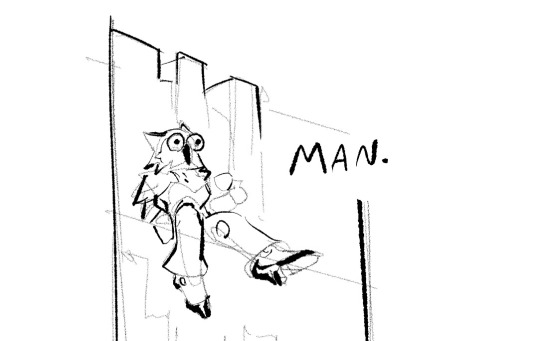
In 2022 I was drafting up Umbra's design with mostly concrete details. At this time image generators were newer and much less convincing, and I was a bit less aware of just how unethical they were, so I fed one a text description of what I had drafted for her design out of curiosity. Something along the lines of, "doll of an anthropomorphic owl librarian in glasses, blazer/suit jacket, skirt, corset, high heels, sitting on a bookshelf" and probably a few more terms. Really specific, lengthy prompt.
I try to be open-minded and give new things a shot, but the results were Not Great. Ideally, I'd want to not share the AI pictures at all on-principle, but I feel like it's useful, transparent, and necessary to show them. Both as a means of not hiding anything, but also just to appreciate where the design is at in spite of it.
Outside of this particular collage of Weird Owls, no other pictures on this blog are AI-generated. AI Image Generation is harmful, and I am against its usage.
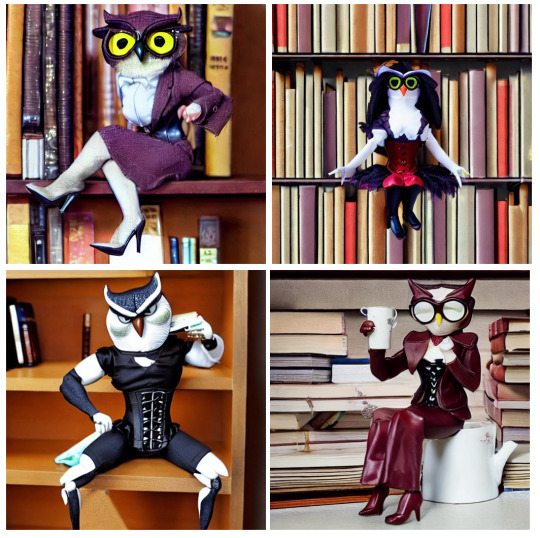
But hey, two of the generated pictures look close, right? The top left is the closest, and bottom right is second.
That's because they started out worse, and I had to actually erase chunks of them and have the generator fill in the blanks to get anything remotely close to what I wanted. Misshapen limbs, unrecognizable anatomy, fever-dream clothing details, etc. They didn't even have a corset or proper legs until I slapped the generator in the face enough times to make it produce them. I was just using it to photobash, which was such an annoying process, I just went "this is dumb" and stopped. They're literally posed like that because I kept erasing and regnerating their limbs until they looked vaguely in-character. It literally only looks passable thanks to STRANGLING it with human input.
Before I used the image generator, I already drafted her to be night-themed with yellow eyes and something like purple, dark blue, or sky-blue as her main color; the generator making one owl yellow-eyed and purple was a happy coincidence, and the only thing the generative AI "came up with" that I didn't already have in mind or included in the prompt was the light blue shirt, which I did adapt into her cyan shirt and stockings/socks as well. That was a good call. You get One Point, Mr. AI.
...Which still meant that at its absolute best, it was a largely redundant step in the creative process if its contribution was worse than what a randomized palette generator or character creator could come up with.
That's already putting the ethics of it aside, like carbon emissions, data pollution, using artists' and photographers' work without credit or permission, the incentive to plagiarize, flooding sites like deviantart with slop, Willy Wonka Shit, etc etc etc. When people say "you can use AI as a tool though", this ordeal was enough to convince me that it's more trouble than its worth, even in its most ethical usage. I feel gross for having even tried. I wish I knew what sources went into the creation of those Weird Owls. It'd be better for research if the right people could be credited.
Nothing else on this blog is AI-generated or ever will be. The art below is purely my own (2022 vs a few weeks ago)):
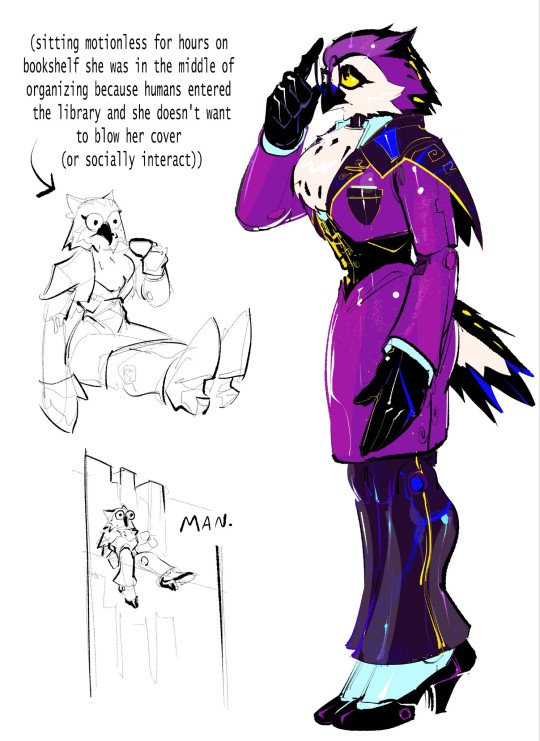

Actually drawing Umbra and solidifying her design was far more rewarding than having an image generator vaguely approximate my own ideas. I wanted her to look really special, so I used a black cape and pants, gold highlights and buttons, and blue undertones to make something more distinct. Also, neck floof. Very important. I wanted the head in particular to look distinct and original, going with bold black streaks to really help her look distinguished.
I also have certain inevitable Hydroisms for Fancy characters like her; most apparent in these designs for Chasey and Kaita from even longer ago, which were more of an influence than anything else. (Old art of mine from like 2021, Kaita ref looks wonky but Chasey still holds up nicely):
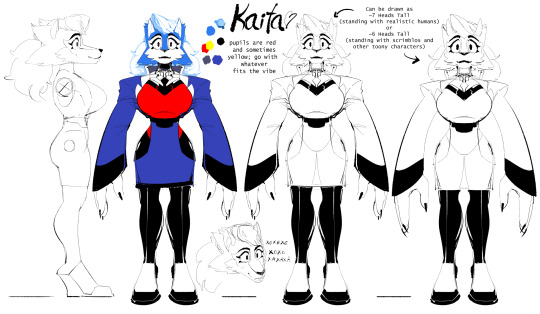
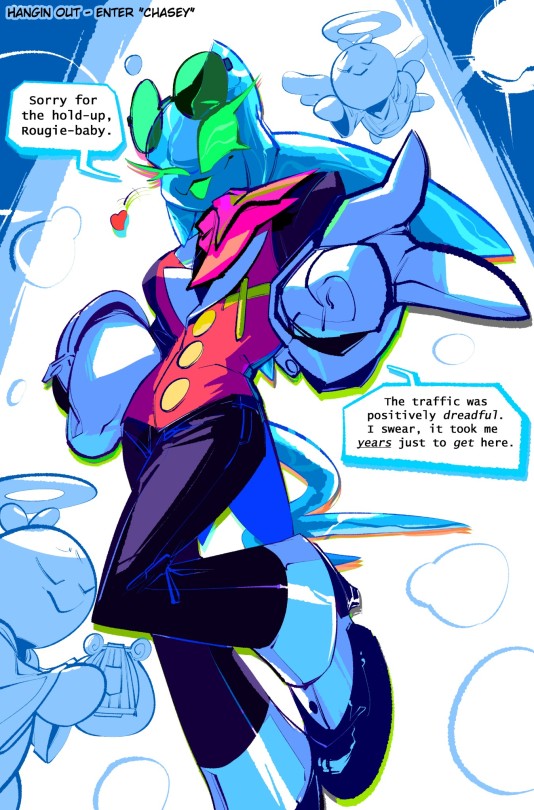
Most of Umbra's other design elements were already commonly used with established ocs like Kaita, like her shape language, corset, skirt, heels, etc. It was my previous work with Chasey that inspired the use of gold buttons and highlights.
Umbra is also now a bluer shade of purple partly to distance the current design from that ordeal. All things considered, I'll probably make her more indigo next time. I already wanted her to have a wide color range from the get-go (Featured below is, again, purely my art from 2022:)
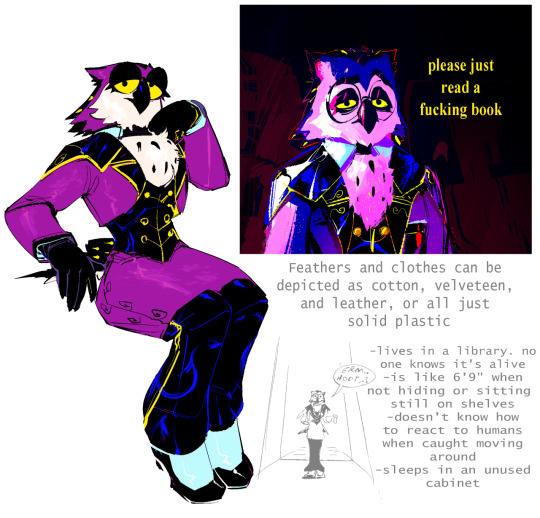
I may use a different colored shirt and stockings in the future. I like to think she has many different shirts and clothes based on the different stages of the night sky, from dusk to dawn, and the painting I made in the top right there was an exploration of her range in different lighting.
All in all, it's frustrating. I'm proud of her design, but explaining all of this is annoying, because it's technically all relevant to showing how her colors were picked and how the design was made. I still technically have AI to """Thank""", in the way you thank a bad experience for encouraging you to make things better out of spite.
112 notes
·
View notes
Text
ALSO food wars message abt perfection replication VS human creativity and innovation. how despite the margin for error no food is truly ever ‘bad’. how having a community of people surrounding you to collaborate with brings out untold depths of ur talent. how we are so focused on consuming more and more in faster speeds that we are creating an unsustainable cycle of consumption that physically cannot be kept up with. in this essay i talk about how food wars represents the AI problem and
44 notes
·
View notes